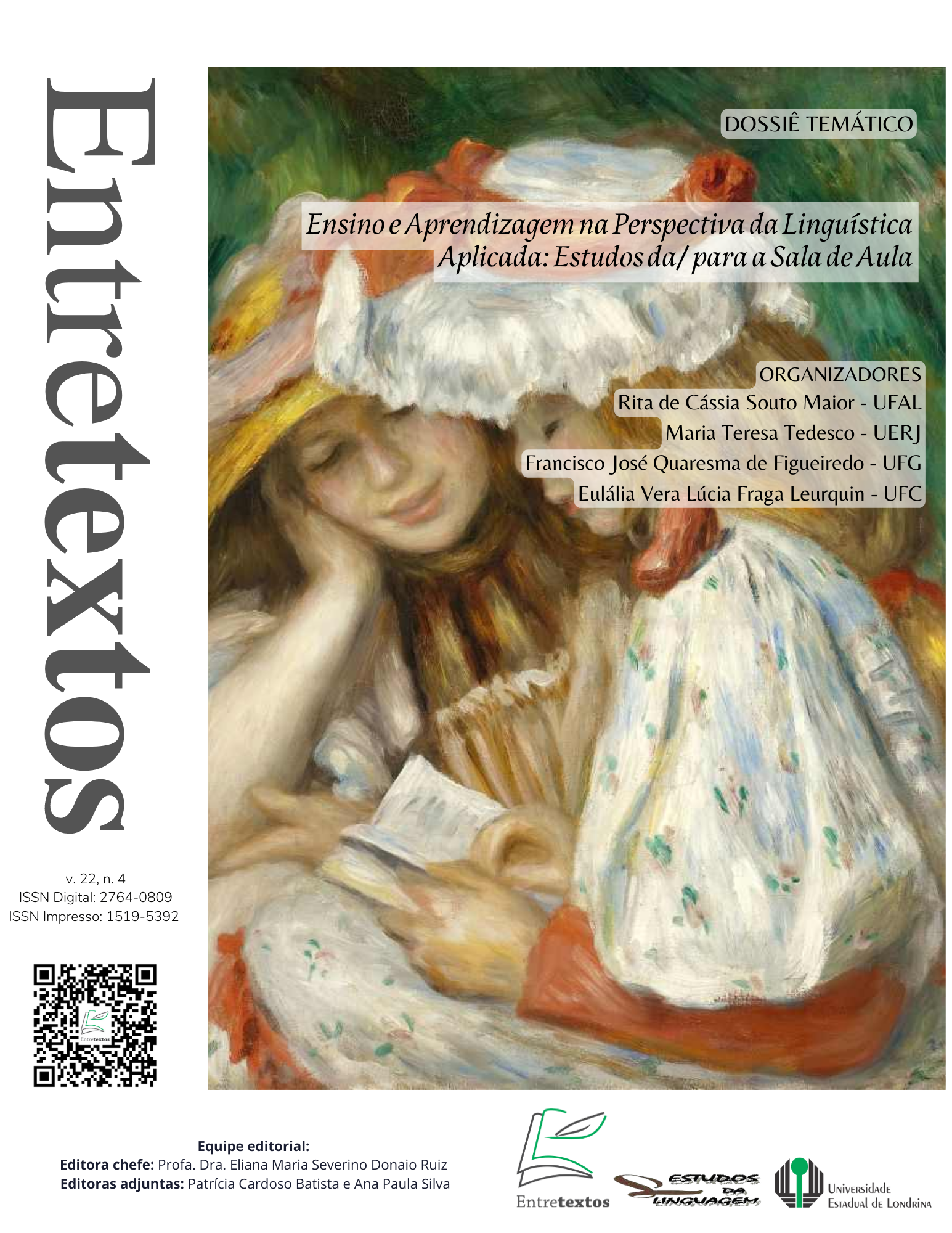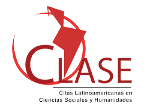Investigando ideologias linguísticas em um material didático de Inglês produzido no CLAC/UFRJ
DOI:
https://doi.org/10.5433/1519-5392.2022v22n4Espp167-187Keywords:
Ideologias Linguísticas, Linguística Aplicada, Lingua Franca, Ensino de línguas, Pós-colonialismoAbstract
It is true to say the English language has the status of lingua franca (CANAGARAJAH, 2006), since there is a greater number of non-native English speakers than native English speakers (CRYSTAL, 2003; GRADDOL, 2006; KACHRU, 1985). On the other hand, the language is still strongly associated with native speakers from the United States and the United Kingdom, in a period of new colonialism (SOUSA SANTOS, 2020). Thinking the area of ​​Applied Linguistics as indisciplinary (MOITA LOPES, 2006) and transgressive (PENNYCOOK, 2006), we align with problematizing practices (PENNYCOOK, 2004) to question linguistic ideologies (ERRINGTON, 2001; WOOLARD, 1998; KROSKRITY, 2004) about native English speakers through the analysis of a didactic material developed in CLAC-English at UFRJ. This research analyzes the first task of the PTMC (SAMPAIO; MARTINS, 2021; xxx, 2021) Decolonizing English, developed at the last level of the regular course (English 8) in the first semester of 2022. In this article, through an interpretative qualitative analysis, we investigate this teaching material as enhancer of discussions and questions about linguistic ideologies, bringing students closer to marginalized literary productions and promoting an anti-hegemonic agenda (MOITA LOPES, 2006) of English language as non-homogeneous and plural, contributing to empowering their learners.
Downloads
References
AMORIM, M. A.; SILVA, M. R. L. O ensino de literaturas na Linguística Aplicada brasileira. Raído, Dourados, v. 14, n. 36, p. 163-189, 2020. DOI: https://doi.org/10.30612/raido.v14i36.11695
BAKHTIN, M. Os gêneros do discurso. In: BAKHTIN, M. Os gêneros do discurso. São Paulo: Editora 34, 2016. p. 11-69.
CANAGARAJAH, S. Negotiating the local in english as a lingua franca. Annual Review of Applied Linguistics, London, v. 26, p. 197-218, 2006.
CHEN, H. A.; TRINH, J.; YANG, G. P. Anti-Asian sentiment in the United States - COVID 19 and history. The American Journal of Surgery, New York, v. 220, n. 3, p. 556-557, 2020.
COSSON, R. Letramento literário: teoria e prática. São Paulo: Editora Contexto, 2018.
CRYSTAL, D. English as a global language. Cambridge: Cambridge University Press, 2003.
DEL VALLE, J. Glotopolítica y teoria del lenguaje. In: DEL VALLE, J. AGLO: anuario de glotopolítica. Buenos Aires: Editorial Cabiria, 2017.
ERRINGTON, J. Colonial linguistics. Annual Review of Anthropology, Palo Alto, v. 30, p. 19-39, 2001.
GRADDOL, D. English next: why global english may mean the end of 'english as a foreign language'. London: British Council, 2006.
KACHRU, B. B. Standards, codification, and sociolinguistic realism: the English language in the outer circle. In: Quirk, R.; Widdowson, H. (ed.). English in the world: teaching and learning the language and the literature. Cambridge: Cambridge University Press, 1985.
KHALIL, O. A. K.; KHALIL, S. S.; CAETANO JUNIOR, E. Xenofobia: um velho sintoma de um novo coronavírus. Revista Thema, Pelotas, v. 20, p. 132-142, 2021.
KOHATSU, L. N.; SAITO, G. K.; ANDRADE, P. F. Imigração, mídia e xenofobia: a ameaça imaginária em questão. In: SILVA, P. F.; BORZUK, C. S.; GONÇALVES JUNIOR, G.Teoria crítica, violência e resistência. São Paulo: Blucher, 2021. p. 125-146.
KONDER, L. A questão da ideologia. São Paulo: Editora Companhia das Letras, 2002.
KROSKRITY, P. V. Language ideologies. In: DURANTI, A. (org.). A companion to linguistic anthropology. London: Blackwell Publishing, 2004. p. 496-517.
MARTINS, G.; SAMPAIO, T.; TILIO, R. Projetos temáticos de multiletramentos críticos: olhares sobre um instrumento pedagógico concebido à luz do letramento sociointeracional crítico em um projeto de extensão. Revista Horizontes de Linguistica Aplicada, Brasília, v. 20, n. 2, p. 1-17, 2021.
MOITA LOPES, L. P. Ideologia linguística: como construir discursivamente o português no século XXI?. In: MOITA LOPES, Luiz Paulo da (org.). O português no século XXI: cenário geopolítico e sociolinguístico. São Paulo: Editora Parábola, 2013. p.18-52.
MOITA LOPES, L. P. Pesquisa interpretativista em lingüística aplicada: a linguagem como condição e solução. DELTA: Documentação e Estudos em Linguística Teórica e Aplicada, São Paulo, v. 10, n. 2, p. 329-338, 1994.
MOITA LOPES, L. P. Uma linguística aplicada mestiça e ideológica: interrogando o campo como linguista aplicado. In: MOITA LOPES, L. P. (org.) Por uma linguística aplicada INdisciplinar. São Paulo: Parábola, 2006. p. 13-44.
MONTEIRO, M. N. Investigando ideologias linguísticas sobre o "falante nativo" em um livro didático local de inglês: uma análise de base documental. Revista Intercâmbio, São Paulo, v. 49, p. 41-64, 2021. DOI: https://doi.org/10.23925/2237.759X.2021V49.54142
PENNYCOOK, A. Critical applied linguistics. In: DAVIES, A.; ELDER, C. (ed.) The handbook of applied linguistics. Malden: Blackwell Publishing, 2004. p. 784-807.
PENNYCOOK, A. Uma linguística aplicada transgressiva. In: MOITA LOPES, L. P. (org.). Por uma linguística aplicada INdisciplinar. São Paulo: Parábola, 2006. p. 67-84.
RAJA, M. A.; ELLIS, J. W.; NANDI, S. The postnational fantasy: essays on postcolonialism, cosmopolitics and science fiction. McFarland: McFarland Books, 2006.
RAJAGOPALAN, K. Postcolonial world and postmodern identity: some implications for language teaching. DELTA: Documentação de Estudos em Lingüística Teórica e Aplicada, São Paulo, v. 21, p. 11-20, 2005.
RECHOU, B. R. Educação literária e cânone literário escolar. Letras de Hoje, Porto Alegre, v. 45, n. 3, p. 75-79, jul./set. 2010.
ROJO, R.; MOURA, E. Letramentos, mídias, linguagens. São Paulo: Parábola Editorial, 2019.
SANTOS, B. S. O fim do império cognitivo: a afirmação das epistemologias do Sul. Belo Horizonte: Autêntica Editora, 2020.
THE NEW LONDON GROUP. A pedagogy of multiliteracies: designing social futures. Harvard Educational Review, Cambridge, v. 66, n. 1, p. 60-92, 1996.
TILIO, R. O livro didático contemporâneo: apresentação de uma proposta. In: MACIEL, R.; TILIO, R.; JESUS, D.; CHAVES, A. (org.). Linguística aplicada para além das fronteiras. Campinas: Pontes, 2018. p. 261-297.
TILIO, R. Uma pedagogia de letramento sociointeracional crítico como proposta para o ensino de línguas na contemporaneidade por meio de uma abordagem temática. In: FINARDI, K.; SCHERRE, M.; VIDON, L. (org.). Língua, discurso e política: desafios contemporâneos. Campinas: Pontes, 2019. p. 187-210.
TILIO, R. Voices. São Paulo: Richmond, 2015. v. 4.
WOOLARD, K. A. Introduction: language ideology as a field of inquiry. In: SCHIEFFELIN, B. B.; WOOLARD, K. A.; KROSKRIT, P. V. (org.). Language ideologies: practice and theory. Oxford: Oxford University Press, 1998. p. 3-47.
YOUNG, R. Postcolonialism: a very short introduction. Oxford: Blackwell. 2003.
Downloads
Published
How to Cite
Issue
Section
License
Copyright (c) 2023 Julianna Ferreira da Silva, Rogério Casanovas Tilio

This work is licensed under a Creative Commons Attribution 4.0 International License.
Entretextos adota a Licença Creative Commons Attribution 4.0 International, portanto, os direitos autorais relativos aos artigos publicados são do/s autor/es.
Sob essa licença é possível: Compartilhar - copiar e redistribuir o material em qualquer suporte ou formato. Adaptar - remixar, transformar, e criar a partir do material, atribuindo o devido crédito e prover um link para a licença e indicar se mudanças foram feitas.
























